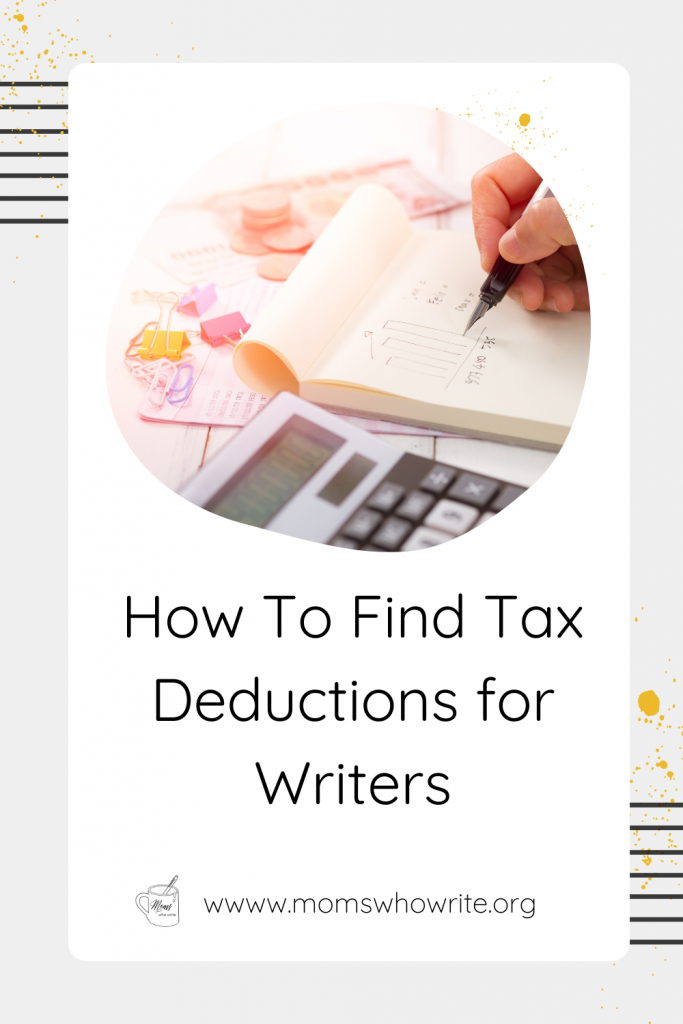If you’re making income on your writing, you’re going to have to pay taxes– good-ole American life. I know, taxes are terrible. But thankfully, there are a number of tax deductions for writers you can claim on your tax return to help you save a bit of money.
“There are two certainties in life; death and taxes.” – Benjamin Franklin
Now, I am NOT a tax professional (nor do I play one on TV). However, I’ve learned a few things over the years and want to share them as you continue your writing adventures. *Please talk to a tax professional before you implement any changes, as state and federal tax laws are extremely nuanced and fluid and vary from person to person.*
A writer’s tax story…
A little context: I’ve been a self-published author since 2019, and the first year, I didn’t write anything off on my taxes. Profited $600 and called it good. I then paid a good chunk in taxes on that amount which I don’t recommend. 0 Stars.
In my second year of writing, I also made a profit, but I was able to write off a bit more as business expenses. This made my “money owed” much less to the IRS. In fact, on paper, I had lost money that year.
I was able to make an even larger profit in the third year, and because I had write-offs, I was able to qualify for small business credit. So, these deductions are actually pretty critical to keeping your business growing!
Good tax practices before you deduct
Before you can total tax deductions, you have to know what you made and what you spent over the year. Here are some considerations for helping to make tax prep season a little easier.
Keep thorough business records
Keeping track of your writing expenses and income throughout the year is crucial. You need to know how much you made, how much you paid, and your overall net income. Without this information, not only could you land in hot water with the IRS, you won’t be able to claim the tax deductions you deserve.
I use a spreadsheet, but even a word processor or a photo of receipts is better than scrambling in your bank account to gather all your details. Even if you choose to omit certain expenses (we’ll talk about that later) then you can at least make sure you’ve got documentation available.
If you’re making a good amount of writing income, it may be worth investing in a program such as Quickbooks. You can keep track of invoices, payments, expenses, sales, and more. Tax reports are easy to pull at the end of the year and you can even automate expenses that occur every month. Plans start at low as $12.50 per month and increase based on your needs.
Make a profit
This sounds self-explanatory, but it has to be said.
You should show a profit (anything above $0.00) once every 3-5 years. This helps keep your business looking like a business and not just a tax write-off/hobby. The feds dislike that. They want to see you making money so they can pry it from your wallet as often as possible help fund wonderful community things!
Secure your tax forms early
If your writing income includes freelance work, you’re going to need to obtain a tax from your clients as proof of payment. These will mostly consist of 1099 forms for non-employee compensation. Contact your clients early to determine when and how they send their tax forms. Also, ensure your clients have your correct address to avoid tax forms getting lost in the return mail.
Examples of tax deductions for writers
On to the fun part: business expenses. Now, tax deductions for writers must be legitimate expenses. If you count something like your family road trip as a business expense, you’ll need to be sure to document that you did actual work during that trip that pertained to the travel. Even this can get tricky, so consult with your tax guy before you take the trip if you plan to expense.
When we talk about write-offs or deductions here, we’re not talking about your personal deductions. We’re talking about expenses directly related to your writing. Things that help you create your books or help run your business, without these specific expenses, you could not be making the income you are.
Tax deductions decrease your profit on paper by showing how much of your income is going back into the business. If you’re concerned you won’t make a profit on paper, you can always decide not to deduct your expenses. Sometimes, that actually makes more sense than not. That’s more money for the government, and they’re not going to argue that one.

Here are some common tax deductions for writers you may not have considered:
- Subscriptions (probably one of the biggest expenses!)
- Publishing costs (ISBNs, printing services, listing services)
- Editing & graphics tools
- Business phone & internet
- Office space (must be FOR that work only)
- Gas mileage to and from events
- Meals eaten out while working
- Outsourced expenses like formatting/marketing/editing
- Marketing materials, promotions, swag
- Writing conferences
- Office supplies such as writing tools, ink, paper, journals (yes, I saw your eyes light up on that one!)
- Writing equipment (computers, keyboards)
- Office cleaning fees and decor (if you rent a space)
- Donations to charities from your business
- Sponsorships (ask your child’s sports teams if they take sponsorships!)
- Advertising materials and influencer marketing
- Word processing programs/internet security
- Booth fees/tables/canopy/event gear
- Writing classes and seminars
- Hands-on research (road trips, books, etc.)
- Website management tools
Some of these expenses are more complicated than others. There are some writers who will try to deduct phone bills and electric bills and cable bills from their taxes. This can get pretty tricky and often it may not even be worth the risk of an audit.
Start simple. Look at the things you use every day. Don’t go overboard with expenses, but definitely keep track as they can make a huge difference at the end of the year.
Last thoughts on tax deductions for writers
If you’re second-guessing an expense, talk to your tax guy. If you can’t find receipts or proof that paid for an expense, it’s best to leave it off. Often, just keeping decent records and being mindful can make a huge impact on what can feel like a big hit from Uncle Sam. Good luck writers!
About The Writer: Niccole Perrine is a homeschooling mom, children’s chapter book author, entrepreneur, and digital marketing agent living in Southwest Idaho.
